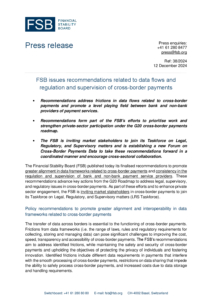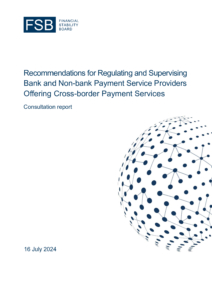Summary of document history
Inconsistencies in the legal, regulatory, or supervisory regimes applied to banks and non-banks that provide cross-border payment services can be an obstacle towards achieving cheaper, faster and easily accessible cross-border payments.
Individual jurisdictions have taken varying and sometimes inconsistent approaches to regulating and supervising bank and non-bank payment services providers (PSPs) offering cross-border payments. Such inconsistencies can result in complex compliance processes, increasing the costs and reducing the processing speed.
This report discusses the role of banks and non-banks in cross-border payments, as well as the relevant frictions and risks. The report sets out policy recommendations to strengthen consistency in the regulation and supervision of banks and non-banks in their provision of cross-border payment services in a way that is proportionate to the risks associated with such activities. This approach aims to reduce the prospect of regulatory arbitrage by establishing a level playing field that takes into account differences in business models and risk profiles.
FSB Recommendations
Recommendation 1: Competent authorities should conduct risk assessments of the cross-border payments sector, the aim of which should be to identify, understand and assess the risks associated with PSPs active within the authorities’ jurisdiction in cross-border payment services.
Recommendation 2: Based on the findings of the payment sector risk assessments, competent authorities should review existing regulatory, supervisory, and oversight regimes to ensure that the regimes: 1) address all the key risks identified; 2) are proportional to the risks identified, with particular attention to operational risks (e.g. fraud, cyber and third-party risks), resilience and financial crime risks, and 3) are applied consistently and in coordination with all relevant competent authorities across the sector. Competent authorities should consider undertaking or seeking adjustments to laws, regulations, and supervision and oversight models as needed.
Recommendation 3: Competent authorities’ regulatory and supervisory regimes related to cross-border payments should be designed to promote consumer protection and address consumer harms.
Recommendation 4: Competent authorities should develop, publish, and communicate payments-related supervisory and oversight expectations to promote safe and efficient payment services, including the guidance relating to application of the risk-based approach.
Recommendation 5: Competent authorities should: 1) review licensing or registration criteria for risk-proportionate requirements, including measures to promote consumer protection and address new services such as account information services, payment initiation services, digital wallets, and the provision of services through agents and other intermediaries; and, if necessary, 2) adjust the licensing or registration processes for PSPs to incorporate requirements such as conducting fit and proper tests, reviews of AML/CFT compliance programs and oversight of agents and other intermediaries.
Recommendation 6: Competent authorities both within and across jurisdictions should, where applicable, implement or expand cooperative arrangements for information sharing to support access to relevant information and data for comprehensively assessing risks as well as the sources of frictions and, when appropriate, supporting regulatory or supervisory action.

